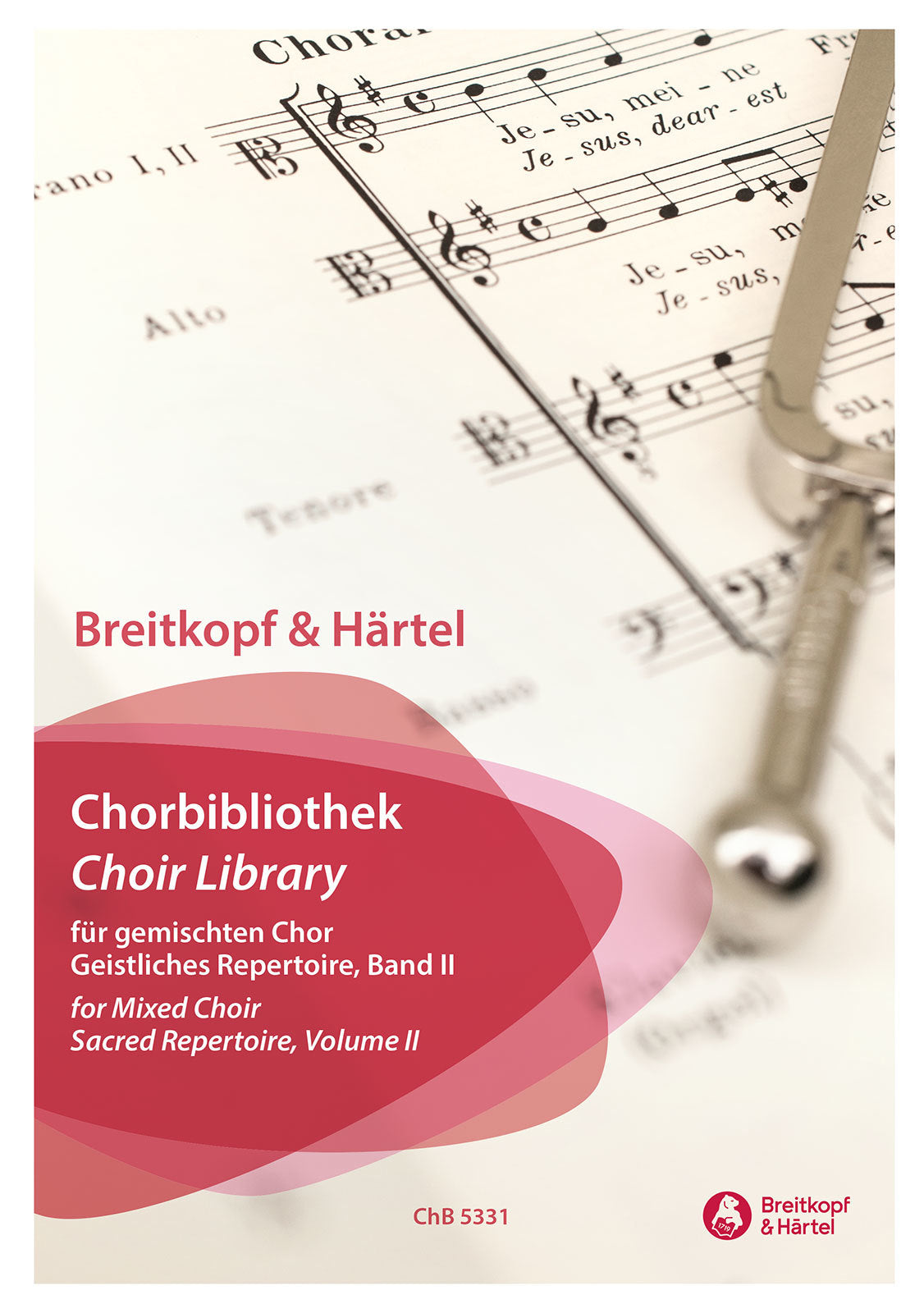Choir Library for Mixed Choir - Sacred Repertoire Volume 2 (Holy Week to Pentecost)
In stock and typically ships within 1 business day.
- Composers: Giovanni Pierluigi da Palestrina (1525-1594), Wilhelm Weismann, Claudio Monteverdi (1567-1643), Arnold Mendelssohn (1855-1933), Georg Philipp Telemann (1681-1767), Johann Nepomuk David (1895-1977), Kurt Thomas (1904-1973), Hans Leo Hassler (1564-1612), Marc'Antonio Ingegneri, Franz Schubert (1797-1828), Günter Raphael (1903-1960), Reinhard Ohse, Max Reger (1873-1916), Felix Mendelssohn (1809-1847)
- Instrumentation (this edition): SATB Choir
- Originally for: Basso continuo, SATB Choir, Soprano, Double Choir (SATB + SATB), SSAATTBB Choir
- Work Language: German
- ISMN:
- Size: 7.5 x 10.6 inches
- Pages: 324
Description
Choral music for all occasions in the original notational image, sorted by genres and themes
The enormous range of publications for mixed choir is published in the Choir Library in separate volumes for secular and sacred repertoire. The sacred part comprises five volumes, the first three of which contain all the works that can be textually and liturgically arranged in the order of the church year – sorted by Christian feasts and holidays. The first volume ranges from Advent to Palm Sunday, the second volume from the Holy Week to Pentecost and the third volume covers the time from Trinity Sunday to the last Sunday before Advent. The fourth volume contains motets without a specific relation to the liturgical year as well as sacred songs and festive music. The conclusion is formed by the fifth volume with Mass settings, sacred concertos and liturgical chants. By reason of limited space, only shorter settings of the Ordinary are found here. The represented composers range from the renaissance to the 20th century – from Palestrina, Schütz and Bach over Mendelssohn, Brahms and Reger to Johann Nepomuk David, Kurt Thomas and Günter Raphael.
Works:
- Ingegneri: Nos. 1-3 from Responsories for Maundy Thursday
- Palestrina: Missa "Fratres ego enim accepi"
- Monteverdi: Confitebor tibi, Domine, SV 296
- Palestrina: Stabat mater dolorosa
- Telemann: Fürwahr, er trug unsre Krankheit, TWV 8:18
- K. Thomas: Nun freut euch, lieben Christen from Kleine Geistliche Chormusik, Op. 25
- Ohse: 8 Motets for the Liturgical Year
- Reger: Gehet in alle Welt from 20 Responsories
- Mendelssohn: Psalm 22 (Mein Gott, warum hast du mich verlassen), MWV B 51, Op. 78, No. 3
- A. Mendelssohn: Passionsgesang, Op. 90, No. 1
- David: Ein Lämmlein geht and trägt die Schuld (A little lamb carries the guilt)
- David: Christus, der uns selig macht (Christ, who is our blessing), Work 60, 3
- Raphael: Jesus Christus, unser Heiland, Op. 39, No. 2
- Schubert: Chor der Engel, D 440
- Ohse: Acht kleine Motets for das Kirchenjahr
- Palestrina: Laudate Dominum
- Monteverdi: Laudate Dominum
- Hassler: Laudate Dominum
- W. Weismann: Der 23. Psalm (Der Herr ist mein Hirte)
- Palestrina: Jubilate Deo
- Hassler: Jubilate Deo
- Hassler: Cantate Domino
- Monteverdi: Cantate Domino
- Hassler: Laetentur coeli
- Hassler: Gratias agimus tibi
- David: Victimae pascali laudes Werk 35,1
- A. Mendelssohn: Motet for Ascension Day, Op. 90, No. 3
- Reger: Und es erschienen den Aposteln Zungen from 20 Responsories
- K. Thomas: Schmücket das Fest mit Maien from Kleine Geistliche Chormusik, Op. 25
- A. Mendelssohn: Motet for Pentecost, Op. 90, No. 4
- A. Mendelssohn: Nun bitten wir den heiligen Geist
- David: Pfingsten "Komm, Gott Schöpfer, Heiliger Geist" Werk 60,5
- Raphael: Heiliger Geist, du Tröster mein, Op. 39, No. 3
Publishers use a lot of words to describe what they sell, and we know it can be confusing. We've tried to be as clear as possible to make sure you get exactly what you are looking for. Below are descriptions of the terms that we use to describe the various formats that music often comes in.
Choral Score
A score for vocalists that only contains the vocal lines. The instrumental parts are not there for reference. Generally, cheaper than a vocal score and requires multiple copies for purchase.
Facsimile
Reproductions of the original hand-written scores from the composer.
Full Score
For ensemble music, this indicates that the edition contains all parts on a single system (there are not separate parts for each player). In larger ensembles, this is for the conductor.
Hardcover
Hardbound. Generally either linen-covered or half-leather.
Orchestral Parts
Similar to a wind set, this is a collection of parts. In the case of strings, the numbers listed are the number of copies included, though generally these are available individually (often with minimum quantities required).
Paperback
When publishers offer multiple bindings (e.g. hardcover) or study scores, this is the "standard" version. If you're planning to play the music, this is probably what you want.
Performance / Playing Score
A score of the music containing all parts on one system, intended for players to share. There are not separate parts for each player.
Set of Parts
For ensemble music, this indicates that there are separate individual parts for each player.
Solo Part with Piano Reduction
For solo pieces with orchestra, this is a version that contains a piano reduction of the orchestra parts. For piano pieces, two copies are typically needed for performance.
Study Score
A small (think choral size) copy of the complete score meant for studying, and not playing. They make great add-ons when learning concertos and small chamber works.
Vocal Score
A score prepared for vocalists that includes the piano/organ part or a reduction of the instrumental parts.
Wind Set
For orchestral music, this is a collection of wind and percussion parts. The specific quantities of each instrument are notated.
With Audio
In addition to the printed music, the edition contains recordings of the pieces. This may be an included CD, or access to files on the internet.
With / Without Fingering (Markings)
Some publishers prepare two copies - a pure Urtext edition that includes no fingering (or bowing) suggestions and a lightly edited version that includes a minimal number of editorial markings.



